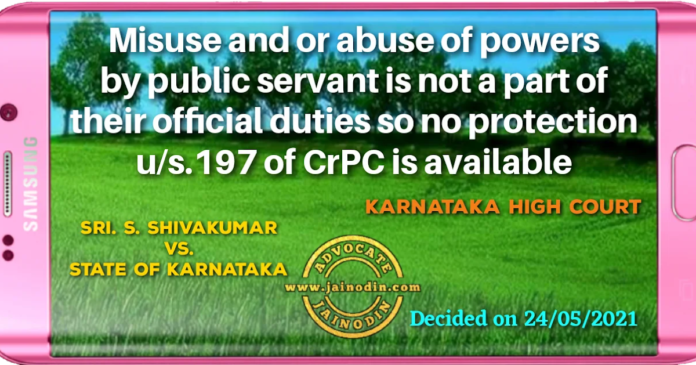[ad_1]
If the authority vested in a public servant is misused for doing things which are not otherwise permitted under the law, such acts cannot claim the protection of Section 197 Cr.P.C.
In the light of the principles laid down in the judgment referred supra, this Court has to analyse the materials on record. I have already pointed out that the complainant’s son was detained in illegal custody for a period of 2 days is not in dispute and also he was summoned to enquire is also not in dispute. It is also to be noted that I have already pointed out the medical evidence with regard to the fact that he was subjected to physical torture and document of Ex.P.28 is clear that he was subjected to man handling and as a result, he took treatment at Janatha Nursing Home. It is also important to note that on account of said humiliation, he took the extreme step of committing suicide as he was tortured, assaulted and detained in illegal custody for a period of 2 days in the police station. It is also apparent prima facie on record that departmental enquiry was conducted and at the fist instance the report was given against these petitioners vide report dated 25.06.2010 and the same would prima facie discloses that the police had excesses their powers. It is also not in dispute that ultimately the son of the complainant was not arraigned as an accused in the said case. It is also not in dispute that the very complainant in the said chain snatching case, has not identified the son of the complainant and there are no criminal antecedents against him. When such being the case, the protection envisaged under Section 197 of Cr.P.C. or Section 170 of KP Act cannot be extended to the petitioners herein.[Para No.27]
Learned Magistrate, in detail considered the statement of witnesses, who have been examined i.e., 7 in number and also while passing a detailed order, assigned the reasons. Learned Revisional Judge also examined the legal aspect and also the factual aspect of the case and passed a detailed reasoned order and comes to the conclusion that there is no merit in the revision. The Court also while issuing the process against the petitioners herein considered the sworn statement as well as allegations made in the complaint and has rightly come to the conclusion that it is a fit case to proceed against the petitioners herein[Para No.28]
and have to be considered dehors the duties which a public servant is required to discharge or perform.
The Apex Court also in the judgment of P.P.Unnikrishnan v. Puttiyottil Alikutty reported in (2000) 8 SCC 131, wherein the Apex Court observed as follows:-
“21. If a police officer dealing with law and order duty uses force against unruly persons, either in his own defence or in defence of others and exceeds such right it may amount to an offence. But such offence might fall within the amplitude of Section 197 of the Code as well as Section 64(3) of the K.P. Act. But
if a police officer assaults a prisoner inside a lock-up he cannot claim such act to be connected with the discharge of his authority or exercise of his duty unless he establishes that he did such acts in his defence or in defence of others or any property. Similarly,if a police officer wrongfully confines a person in the lock-up beyond a period of 24 hours without the sanction of a Magistrate or an order of a court it would be an offence for which he cannot claim any protection in the normal course, nor can he claim that such act was done in exercise of his official duty. A policeman peeping a person in the-lock-up for more than 24 hours without authority is not merely abusing his duty but his act would be quite outside the contours of his duty or authority.” [Para No.30]
…………….
It is also important to note that it is not in dispute that the case has been registered against the unknown person, who snatched the chain. The petitioners herein are also not disputing the fact that the son of the complainant was secured to the police station. It is also important to note that he was not identified by the complainant in the chain snatching case and that he has not been arraigned in the case subsequent to the investigation also but he was in illegal custody of the petitioners herein and subjected him for physical torture.
Karnataka High Court
Sri. S. Shivakumar
Vs.
The State Of Karnataka
Decided on 24/05/2021
[ad_2]
Source link


